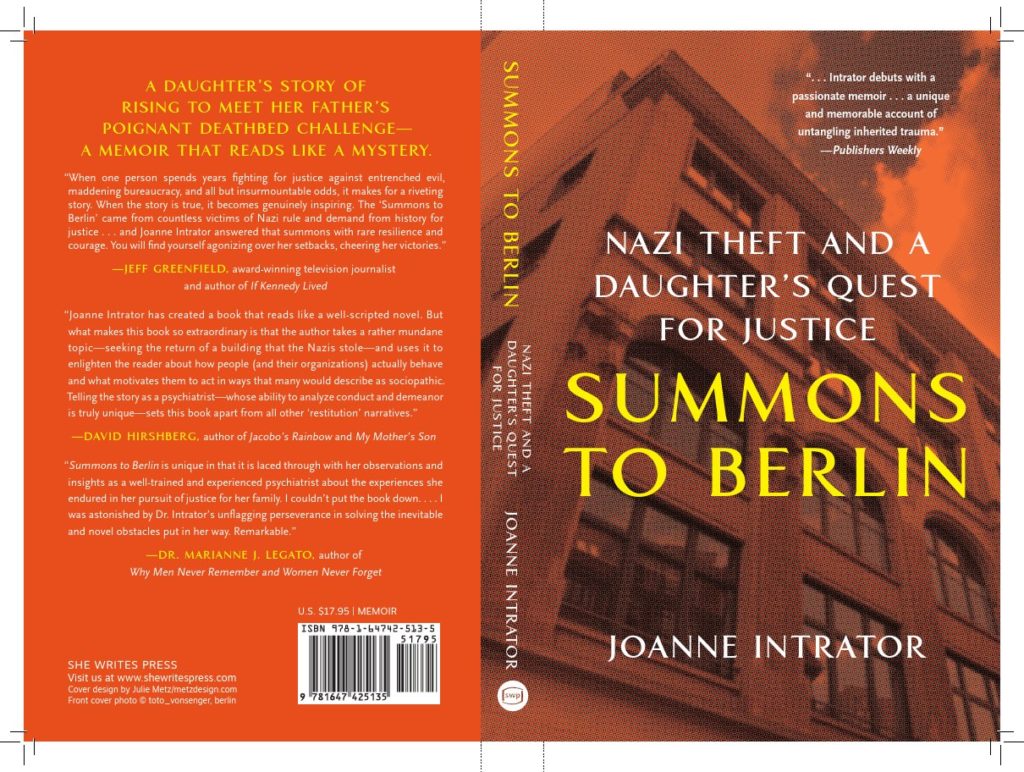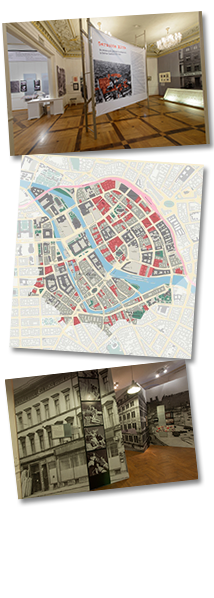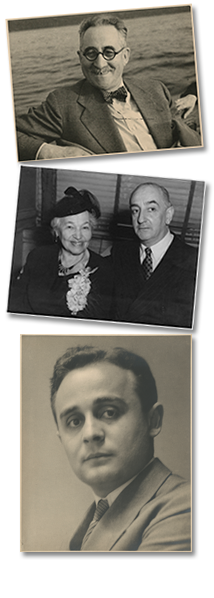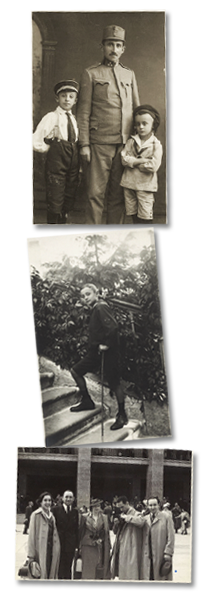SUMMONS TO BERLIN, a memoir by Joanne Intrator
 Buy the Book: Amazon, Barnes & Noble, Books-A-Million, Bookshop
Buy the Book: Amazon, Barnes & Noble, Books-A-Million, BookshopPublished by: She Writes Press
Release Date: August 1, 2023
ISBN13: 978-1647425135
Overview
On his deathbed, Dr. Joanne Intrator’s father poses two unsettling questions:
“Are you tough enough? Do they know who you are?”
Joanne soon realizes that these haunting questions relate to a center-city Berlin building at 16 Wallstrasse that the Nazis ripped away from her family in 1938. But a decade is to pass before she will come fully to grasp why her father threw down the gauntlet as he did.
Repeatedly, Joanne’s restitution quest brings her into confrontation with yet another of her profound fears surrounding Germany and the Holocaust. Having to call on reserves of strength she’s unsure of possessing, the author leans into her professional command of psychiatry, often overcoming flabbergasting obstacles perniciously dumped in her path.
The depth and lucidity of psychological insight threaded throughout Summons to Berlin makes it an attention-grabbing standout among books on like topics. As a reader, you’ll come away delighted by knowing just who Dr. Joanne Intrator is. You’ll also feel ready to cheer for her, because in the end, she proves far more than tough enough to satisfy her father’s unnerving final demands.
Please take a moment to read this article about my process in writing Summons to Berlin. I hope the things I wrote here will be helpful to others.
 Endorsements
Endorsements
"Psychiatrist Intrator debuts with a passionate memoir about seeking restitution for her family’s financial losses under Nazi rule. In the 1930s, Intrator’s grandfather was a successful Berlin businessman, and her father was a promising law student. The city’s increasingly restrictive environment for Jews led to the forced auction of the family’s commercial building in East Berlin; it was turned into a factory that produced Nazi flags and the yellow stars Jewish citizens were made to wear. Nearly a century later, Intrator—whose family avoided Nazi camps by escaping to the United States—is tasked with proving that her family lost the building due to antisemitism in order to receive reparations for its seizure. As a psychiatrist, Intrator is attuned to the micro and macro traumas of the Holocaust and its legacy, regularly calling out the “stonewalling” and “gaslighting” tactics she confronts from the contemporary German government. She’s also sharply aware of the psychological toll her quest takes on her; when she meets with an unsympathetic German attorney, she admits, “it was degrading... knowing that people such as [him] enjoy[ed] full access to the society from which my family had been ousted.” Though the specifics of German law can be confusing and dry, Intrator succeeds in the family-focused portions of her narrative. This is a unique and memorable account of untangling inherited trauma."
—Publisher's Weekly
“Dr. Joanne Intrator has a powerhouse personality and a razor-sharp intellect. Her quest for restitution for one of the center-city Berlin properties that the Nazis stole from her family during the Holocaust is an inspiring saga of vindication and justice, and of one very determined woman prevailing against seemingly impossible odds.”
—Dean Pitchford Academy Award and Golden Globe Award Winner
“Joanne Intrator's proposed Summons to Berlin is a real-life story that simply must be told. Intrator's perseverance in pursuing justice for her family—in the matter of a center-city Berlin property stolen during the Holocaust era -- is a model of courage and gumption for us all. Where an indifferent German bureaucracy expected Dr. Intrator to split the value of the property with an heiress of Nazis, and additionally wanted to sweep the Nazi history of the building under the rug, Intrator dug and dug and dug and then dragged that Nazi history out into the light of day. That she simultaneously was working on groundbreaking research into the brain structure of psychopaths -- work that relates directly to the complex mysteries of the Nazi phenomenon—guarantees that her unique story will be informed by equally unique insights. Joanne’s story is certain to appeal to readers who love when a strong woman pursues and achieves her goals.”
—Kathrin Seitz, Writer and Producer
“A courageous and determined daughter confronts the German government, seeking justice for her parents, who had been victims of Nazi racism and immorality. Joanne Intrator’s story is that of a woman who dares to confront those who would find security in silence, even as this “silence” is perpetuating the evil and immorality that her parents endured.”
—Rabbi David Greenberg, Temple Sharaay Tefila, Bedford Corners, New York
“It took a lot of guts for Joanne Intrator to go to Berlin and fight for her family’s building. To think that through her fierce determination, Joanne managed to get uncovered that Nazi flags, and worse yet, one million yellow Jewish star patches were manufactured in her family’s building during the war.
I know that Joanne had to morph from being the dutiful daughter of German-Jewish refugees to become assertive in an environment that was totally disinterested, that is, when it wasn’t being downright obstructionist. She could have taken the easy way out and settled at the beginning, gotten some money and gone on with her life. But that has never been Joanne’s way. The same resolve that drove her to become a psychiatrist—years after graduating from Connecticut College—led her to seek justice in Berlin, and makes her a fine model for all women.
I am really looking forward to reading her book and hopefully, to seeing a film based on her story.”
—Judy Licht, Television and Print Journalist
“Dr. Joanne Intrator is uniquely positioned in the literary world to bridge whatever divides there may be between today’s Germans, and survivors and descendants of Nazi terror. Her research assistance was invaluable to me in curating the ‘Geraubte Mitte’ exhibit for the City Museum of Berlin. And, she was instrumental in arranging for the exhibit to travel to New York City. I saw students at a Berlin high-school listening to Dr. Intrator with rapt concentration as she recounted her family’s Holocaust-era stories. Her memoir is certain to be purchased by every school library in Germany, as well as by countless individual consumers.”
—Dr. Benedikt Goebel, Büro für Stadtforschung, Berlin
“Doctor Intrator’s Summons to Berlin is unique in that it is laced through with her observations and insights as a well trained and experienced psychiatrist about the experiences she endured in her pursuit of justice for her family. “I couldn’t put the book down” is a frequently used comment to praise an author’s work. In fact, I opened this book late one afternoon and read without stopping for five hours, mesmerized by the shocking details of Dr. Intrator’s experience. I was astonished by her unflagging perseverance in solving the inevitable and novel obstacles put in her way by her assigned and unmotivated German advocates. Her ingenious solutions to issues that would have stopped a lesser spirit were remarkable. This is an account of courage and insightful analysis of not only the author’s responses to the challenges she faced, but of the motives, limitations, and maneuvers of those who sought to dissuade her from her quest.”
—Dr. Marianne J. Legato, Bestselling author of Eve’s Rib
“Joanne Intrator’s Summons to Berlin is an important and engrossing book. Spurred by unsettling deathbed questions, the writer restlessly searches for answers, in order that her father Gerhard should one day rest easy. This memoir reads with intense imagery that is really the stuff of novels. I had to keep reminding myself that the entire narrative is all too real. A remarkable accomplishment that fully honors Intrator’s family legacy while stimulating readers’ minds and touching their hearts as well.”
—Steven K. Baum, Author of Antisemitism Explained and The Psychology of Genocide
“In her captivating Summons to Berlin, Joanne Intrator skillfully interweaves an immense knowledge of Holocaust-era history into a vivid, complex, tragic narration of the restitution conflict that for many years possessed her heart and soul. A triumph!”
—Dr. Ava Siegler, Author of What Should I Tell the Kids?
“Joanne Intrator’s Summons to Berlin is a compelling confession full of intriguing questions and significant insights. In this absorbing book, the author is at once personal and objective, bringing together inner and outer realities in thoughtful, searching ways. Intrator rewards readers with a vivid feel for the complex, often disturbing events at the heart of her narrative.”
—Dr. Michael Eigen, Author of The Sensitive Self and The Psychoanalytic Mystic
“Joanne Intrator’s Summons to Berlin is a gripping story of loss and the struggle for restitution.”
—William H. Weitzer, Ph.D., The John H. Slade Executive Director, Leo Baeck Institute – New York|Berlin
“What really strikes me about Joanne Intrator’s remarkable Summons to Berlin is how compellingly the author – a practicing psychiatrist -- decodes the emotional dimensions of her epic restitution drama. This stimulating, deeply moving book is sure to resonate.”
—Dr. Frank Mecklenburg, Director of Research and Chief Archivist, The Leo Baeck Institute
“Dr. Joanne Intrator’s Summons to Berlin is a most compelling narrative. Readers certainly do not require degrees in psychiatry to become emotionally involved in this book’s complex, satisfying story. As happens, though, I collaborated with Dr. Intrator on the first-ever nuclear imaging study of the brains of psychopaths. What we learned, thanks to our study, helped the writer immensely to vanquish stubborn “forces” who, by far, would have preferred to leave the Nazi oppression of her family hidden away, unknown to the world. That is why I felt particularly moved to contribute a Foreword to Summons to Berlin. What I provide, for those interested, is a chapter in the history of science; namely, of our study of the brains of psychopaths, integrated with my comprehension of how this science melded with Dr. Intrator’s singular quest for justice. My hope, my expectation, is that each thinking reader will come away from Summons to Berlin feeling that much better equipped to overcome obstacles in their own lives.”
—Robert D. Hare, Ph.D., Author of Without Conscience, the Disturbing World of the Psychopaths Among Us, and; Snakes in Suits: Understanding and Surviving the Psychopaths in Your Office
“When one person spends years fighting for justice against entrenched evil, maddening bureaucracy, and all but insurmountable odds, it makes for a riveting story. When the story is true, it becomes genuinely inspiring. The ‘summons to Berlin’ came from countless victims of Nazi rule, as well as from a demand from history for justice . . . and Joanne Intrator answered that summons with rare resilience and courage. You will find yourself agonizing over her setbacks, cheering her victories.”
—Jeff Greenfield, award-winning television journalist and author
“Joanne Intrator has created a nonfiction book that reads like a well-scripted novel. But what makes this book so extraordinary is that the author takes a rather mundane topic—seeking the return of a building that was stolen by the Nazis—and uses it to enlighten the reader about how people (and their organizations) actually behave, and what motivates them to act in ways that many would describe as sociopathic. Telling the story as a psychiatrist—one whose ability to analyze conduct and demeanor is truly unique—sets this book apart from all other ‘restitution’ narratives.”
—David Hirshberg, author of Jacobo’s Rainbow and My Mother’s Son
“Throughout her inspiring memoir Summons to Berlin, Dr. Joanne Intrator writes with her sharp, inquiring mind. Because she is a practicing psychiatrist and accomplished researcher, she is able to imbue her narrative with unique insights not just of the people involved in her case but also more broadly of history and its puzzlements. I find this book an exceptionally enriching read.”
—Elisabeth von Haebler, editor-in-chief of Ästhetik & Kommunikation
“What a harrowing, powerful read. The author, a psychiatrist, brings accessible professional insights to this memoir . . . In chilling detail, she recounts every step of her brave, and often frustrating, yet ultimately successful mission. On his deathbed, Dr. Intrator’s father had asked whether she was “tough enough” for this kind of complex, prolonged battle. Summons to Berlin leaves no doubt that she is.”
—Peggy Taylor, Photographer, author of Streeteries: New York’s Pandemic Outdoor Dining
 Background
Background
My grandparents were prosperous Jews who moved from neighboring villages in Galicia, Poland to Berlin in 1905. It was an effort to improve their import/export business. It also created a better life for their children, offering them a classical German education and the cultural atmosphere of Berlin. My Uncle Alex became a distinguished violinist and my father a lawyer and judge. By the end of World War I, my grandfather was thoroughly immersed into German life: professionally, culturally and as a veteran who had fought alongside his fellow Germans. My grandfather, Jacob Intrator, continued to prosper despite the heavy price Germans paid for World War I. My father, Gerhard, attended the Bismarck Gymnasium, and the family moved to the notable address Kurfursterdamn 185. Other members of the family also fared well, which was how my grandfather came to share an interest in the building at 16 Wallstrasse in Berlin Mitte. His cousins, the Berglases, were also part of a successful business undertaking.
I know little about my grandfather’s businesses, but clearly he was among those Jews that moved from the fringes of European culture and industry to the heart of Berlin. Our family, however, was not among the Jews who abandoned their religious heritage. They worshipped at the Fasanenstrasse Synagogue and my Uncle Alex married the daughter of Magnus Davidson, the esteemed Cantor of the synagogue. While politics, music and business surely pervaded, there remained in the household an attachment to a Jewish identity.
My father was a careful observer of the world. (I remember as a small child he would insist that I read the headlines of the New York Times.) It’s not surprising to me that already in the 1920’s he was reluctant to study law, anticipating what would, indeed, happen: his Jewish presence would not be tolerated. He had early confirmation of his concerns in 1932, when in agreement with his dissertation advisor, he changed his assigned topic (designing the penal program for the future Nazi party) to a politically neutral subject (a failed criminal process decree of 1908).
This grim realism made my father one of the first family members to leave Germany in 1937. He had known for some time that prosperity, culture and national service would not protect a Jew from what was taking place in Germany. Indeed he would have left earlier if not for his parents. He made the move knowing that he would leave behind what had been a privileged life. My father never regained the intellectual, economic and cultural wealth that he enjoyed during his formative years. He brought with him instead the responsibility of safely relocating his family from the trap that was now Germany. The years between 1937 and 1943 were filled with ceaseless efforts to get them first out of Germany and then into the United States despite overwhelming obstacles. My grandparents’ life in Berlin radically changed after Kristallnacht, as friend after friend either emigrated or were rounded up and sent east.
 What had been a large expansive life had shrunk behind the walls of their apartment. Had it not been for the porter in their building and other neighbors, my grandparents would not have survived to make their train trip to Bilbao, Spain. This was late September 1941, just days after the Gestapo gave the order and contract to manufacture all the Jewish Stars in my family’s building on Wallstrasse 16. The stars were to become infamous symbols, sewn onto the clothing of Jews of the Reich. Two short weeks later, all exits were finally closed. By the time my grandparents left Berlin, they been refused by several countries. Their plan was to wait in Lisbon until my father could persuade a country to accept them.
What had been a large expansive life had shrunk behind the walls of their apartment. Had it not been for the porter in their building and other neighbors, my grandparents would not have survived to make their train trip to Bilbao, Spain. This was late September 1941, just days after the Gestapo gave the order and contract to manufacture all the Jewish Stars in my family’s building on Wallstrasse 16. The stars were to become infamous symbols, sewn onto the clothing of Jews of the Reich. Two short weeks later, all exits were finally closed. By the time my grandparents left Berlin, they been refused by several countries. Their plan was to wait in Lisbon until my father could persuade a country to accept them.
While struggling to bring his parents to America, my father was able to bring his sister-in-law and nephew to New York. Unlike his parents and brother Alex, who after Kristallnacht had gone into hiding, these relatives were born in Germany and could get a visa more easily. My father’s brother, despite his Polish birth, made it to England. Cousins that my father tried to help perished. Years later after my father’s death, I followed their fate through letters written to him by these doomed cousins, and by way of money orders my father sent in vain to these family members in the Polish ghettos.
My father’s early years in America were filled with loneliness and heartache for his parents. The learning curve was also great, having to adjust to a new life so radically different from the one he had known. It is clear from the documents I discovered that my father’s focus was to get his parents here. In 1942 he was drafted. At the same time, his parents were hearing rumors via Havana refugees that Hitler was murdering the Jews. “It is hard to believe that the country that has produced such culture has come to this.” (12/2/42) My father was finally able to get his parents to the United States, only to have his father die the day after he arrived in New York, April 1943.
Heartbroken by his father’s death, my father learned he would be deployed to the Pacific front. To a relative he wrote, “the few words I had exchanged with my father in regard to my present situation, have caused thoughts which I cannot control and which raise plenty of doubts. I have been alerted once again that I will be shipped out in a few days and honestly I do not care where I go.” (5/16/43) To the best of my knowledge, my grandfather’s last experience with his son likely included his realization of my father’s uncertain future. I know my father was tortured by that final conversation: his father died not knowing that his son would be safe.
Despite the sorrows of leaving his homeland and all the losses of forced emigration, my father settled into the United States, making every effort and working exceptionally hard, often at two full-time jobs. He married another refugee, my mother, Lotte, and they had two children, myself and my brother Jack. When we were very young, My father became extremely ill and was unable to work. Ironically, when our family was most vulnerable my mother arrived at his hospital bed with a check from the German government. It paid for his medical expenses and provided him a lifelong pension. This was compensation for his brief time in German government service before Hitler. We lived a modest life in Forest Hills, among hundreds of other refugees from Hitler’s regime.
While exhausted and mortally ill, my father learned that my grandfather’s name was historically linked to the Grundbuch of Wallstrasse 16 in Berlin Mitte. Bitter from the humiliation and hardships he had endured, my father was convinced that his family would never see a penny from it. A few days before his death in 1993, my father, who had struggled so valiantly to pass onto his children the success and opportunities that were inherently his, looked at me and in his delirious state asked, “Are you tough enough yet? Do they know who you are?”
He was deeply worried that I did not have the strength or courage to make it on my own without him. Rightfully so, he viewed me as anxious and melancholic. Though I answered, “Yes Daddy,” I knew it would be some time before I could make good on that promise. This book is the journey of how I became what I promised him I’d be.
His death prompted unforeseen changes that crept up on me. It began, I thought, very simply by taking over my father’s claim to Wallstrasse 16. The legal issue was presented to me by one of Berlin’s most renowned lawyers at the Waldorf Astoria in New York: all I needed to prove was that my family lost the building in the fall of 1938 because of Nazi persecution. What could be easier? By this time, I had found hundreds of documents in the basement of our home—paper my historically meticulous father had saved. It was irrefutable proof, or so I thought. And so began an eight-year battle proving that my grandfather was not a poor businessman, as maintained by the Ariseur.
My lawyers explained that the burden of proof was on the Jewish owners, not the people that acquired the property in a “forced auction.” What ensued for the next eight years was a legal battle of epic proportion, involving two countries, foreign laws and foreign lawyers. It was a simpering whirl of insult to injury, not the least of which was learning that the Ariseurs had been long-standing tenants in my family’s building, which had been owned by the Nazi Party since 1933. I learned it all, from the use of the building to manufacture Nazi flags and Stars of David, to be sewn onto the Jews in the Reich, to the ongoing lack of empathy and respect for what was stolen from my family. I would endure a series of legal setbacks—many immoral and unethical—along with further injustices inflicted by the very lawyers I employed to fight for me.
Eventually, I prevailed and was able to establish the critical information necessary to prove my case by hiring an international detective agency to investigate the history of Wallstrasse 16. The writing of this book brings my father’s greatest hope full circle, not just by reclaiming what was rightfully ours, but to honor our relatives and document the proper history of our family as it should be told for generations.